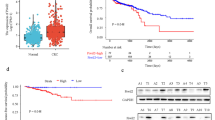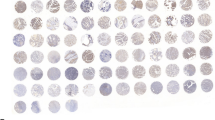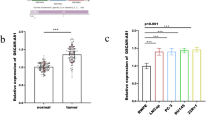Abstract
Esophageal squamous cell carcinoma (ESCC) is one of the most common malignancies worldwide. Androgen receptor (AR) plays an important role in many kinds of cancers. However, the molecular mechanisms of AR in ESCC are poorly characterized. In the present study, Western blot analysis and real-time quantitative PCR were performed to identify differentially expressed AR in 40 ESCC tissue samples, which revealed that the messenger RNA (mRNA) and protein expression of AR is upregulated in the ESCC tissue samples. AR overexpression induced increases in ESCC cell invasion and proliferation in vitro. Silencing of AR inhibited the proliferation of KYSE450 cells which have a relatively high level of AR, and the invasion of KYSE450 cells was distinctly suppressed. Furthermore, AR knockdown led to substantial reductions in matrix metalloproteinase 2 (MMP2) and p-AKT levels in ESCC cell lines, but no significant change in AKT and MMP9 expression. These results suggest that AR is involved in tumor progression, and thus, AR could represent selective targets for the molecularly targeted treatments of ESCC.




Similar content being viewed by others
References
Bray F, Ren JS, Masuyer E, Ferlay J. Global estimates of cancer prevalence for 27 sites in the adult population in 2008. Int J Cancer. 2013;132:1133–45.
Ferlay J, Shin HR, Bray F, Forman D, Mathers C, et al. Estimates of worldwide burden of cancer in 2008: GLOBOCAN 2008. Int J Cancer. 2010;127:2893–917.
Chai J, Jamal MM. Esophageal malignancy: a growing concern. World J Gastroenterol. 2012;18:6521–6.
Reid BJ, Prevo LJ, Galipeau PC, Sanchez CA, Longton G, et al. Predictors of progression in Barrett’s esophagus II: baseline 17p (p53) loss of heterozygosity identifies a patient subset at increased risk for neoplastic progression. Am J Gastroenterol. 2001;96:2839–48.
Kato J, Kuwabara Y, Mitani M, Shinoda N, Sato A, et al. Expression of survivin in esophageal cancer: correlation with the prognosis and response to chemotherapy. Int J Cancer. 2001;95:92–5.
Rosato A, Pivetta M, Parenti A, Iaderosa GA, Zoso A, et al. Survivin in esophageal cancer: an accurate prognostic marker for squamous cell carcinoma but not adenocarcinoma. Int J Cancer. 2006;119:1717–22.
Chen PJ, Yeh SH, Liu WH, Lin CC, Huang HC, Chen CL, et al. Androgen pathway stimulates microRNA-216a transcription to suppress the tumor suppressor in lung cancer-1 gene in early hepatocarcinogenesis. Hepatology. 2012;56(2):632–43.
Ha S, Ruoff R, Kahoud N, Franke TF, Logan SK. Androgen receptor levels are upregulated by Akt in prostate cancer. Endocr Relat Cancer. 2011;18(2):245–55.
Ou Y, Liu L, Xue L, Zhou W, Zhao Z, Xu B, et al. TRAP1 shows clinical significance and promotes cellular migration and invasion through STAT3/MMP2 pathway in human esophageal squamous cell cancer. J Genet Genomics. 2014;41(10):529–37.
Uraoka N, Oue N, Sakamoto N, Sentani K, Oo HZ, Naito Y, et al. NRD1, which encodes nardilysin protein, promotes esophageal cancer cell invasion through induction of MMP2 and MMP3 expression. Cancer Sci. 2014;105(1):134–40.
Balk SP. Androgen receptor as a target in androgen-independent prostate cancer. Urology. 2002;60 Suppl 1:132–9.
Zhang BG, Du T, Zang MD, Chang Q, Fan ZY, Li JF, et al. Androgen receptor promotes gastric cancer cell migration and invasion via AKT-phosphorylation dependent upregulation of matrix metalloproteinase 9. Oncotarget. 2014;5(21):10584–95.
Ma WL, Lai HC, Yeh S, Cai X, Chang C. Androgen receptor roles in hepatocellular carcinoma, fatty liver, cirrhosis and hepatitis. Endocr Relat Cancer. 2014;21(3):R165–82.
Slattery ML, Sweeney C, Murtaugh M, Ma KN, Caan BJ, Potter JD, et al. Associations between vitamin D, vitamin D receptor gene and the androgen receptor gene with colon and rectal cancer. Int J Cancer. 2006;118(12):3140–6.
Yerramilli-Rao P, Garofalo O, Whatley S, Leigh PN, Gallo JM. Androgen-controlled specific gene expression in neuroblastoma cells. J Neurol Sci. 1995;129(Suppl):131–5.
Tihan T, Harmon JW, Wan X, Younes Z, Nass P, Duncan KL, et al. Evidence of androgen receptor expression in squamous and adenocarcinoma of the esophagus. Anticancer Res. 2001;21(4B):3107–14.
Yamashita Y, Hirai T, Mukaida H, Kawano K, Toge T, Niimoto M, et al. Detection of androgen receptors in human esophageal cancer. Jpn J Surg. 1989;19(2):195–202.
Matsuoka H, Sugimachi K, Ueo H, Kuwano H, Nakano S, Nakayama M. Sex hormone response of a newly established squamous cell line derived from clinical esophageal carcinoma. Cancer Res. 1987;47(15):4134–40.
Deryugina EI, Quigley JP. Matrix metalloproteinases and tumor metastasis. Cancer Metastasis Rev. 2006;25(1):9–34.
Acknowledgments
The study was funded by the grant “Experimental Study of the Splenic Artery Targeted Removal of Activated T Cells to Inhibit Acute Rejection”, 2012FFB03401, longitudinal support project by the Science and Technology Department of Hubei Province.
Conflicts of interest
None
Author information
Authors and Affiliations
Corresponding author
Rights and permissions
About this article
Cite this article
Zhang, Y., Pan, T., Zhong, X. et al. Androgen receptor promotes esophageal cancer cell migration and proliferation via matrix metalloproteinase 2. Tumor Biol. 36, 5859–5864 (2015). https://doi.org/10.1007/s13277-015-3257-x
Received:
Accepted:
Published:
Issue Date:
DOI: https://doi.org/10.1007/s13277-015-3257-x




